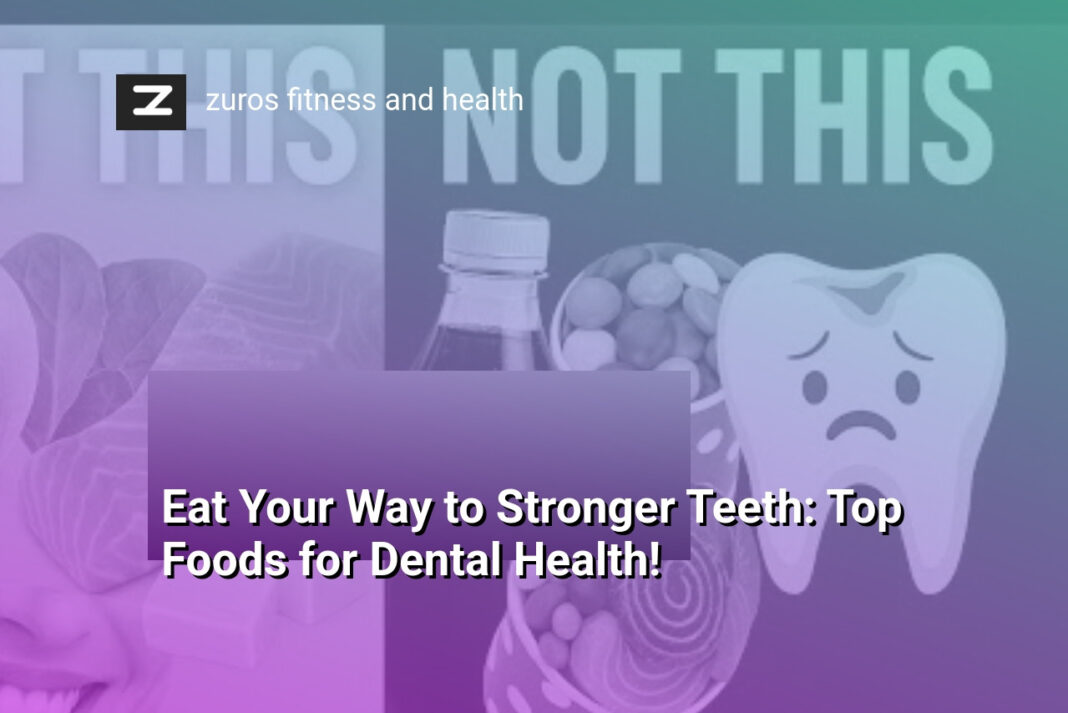The Bottom Line:
- I discovered that our dietary choices play a crucial role in maintaining strong dental health, with certain foods potentially damaging tooth enamel while others can support oral wellness.
- Implementing a comprehensive oral care strategy involves more than just brushing, requiring mindful nutrition and consistent hygiene practices.
- Daily food selections significantly impact long-term dental condition, making each meal an opportunity to protect or harm our teeth.
- Establishing a proactive approach to dental care means combining nutritional awareness with regular professional check-ups and personal hygiene routines.
- By understanding the connection between diet, oral hygiene, and overall dental health, individuals can take meaningful steps towards preventing potential dental issues.
Essential Tooth-Friendly Foods for Optimal Oral Health
Nutrient-Rich Foods for Enamel Protection
Calcium-rich foods play a crucial role in maintaining strong tooth enamel and supporting overall dental health. Dairy products like milk, cheese, and yogurt provide essential minerals that help remineralize tooth surfaces and prevent decay. For those who are lactose intolerant or prefer non-dairy options, leafy green vegetables such as kale and spinach offer excellent calcium alternatives. Almonds and other nuts are particularly beneficial, delivering calcium and protein while helping to neutralize harmful acids in the mouth.
Natural Defenders Against Dental Bacteria
Certain foods act as natural protectors against harmful oral bacteria and promote a balanced oral microbiome. Crunchy fruits and vegetables like apples, carrots, and celery stimulate saliva production, which naturally cleanses the mouth and helps remove food particles. Cranberries and other polyphenol-rich foods contain compounds that prevent bacteria from adhering to tooth surfaces, reducing the risk of plaque formation. Green tea is another powerful ally, containing catechins that combat oral bacteria and reduce inflammation in gum tissues.
Mineral-Packed Dental Health Boosters
Phosphorus-rich foods work synergistically with calcium to strengthen tooth structure and support bone density. Wild-caught fish like salmon and sardines provide excellent sources of phosphorus and omega-3 fatty acids, which help reduce gum inflammation. Eggs are another nutritional powerhouse, offering both calcium and phosphorus in a readily absorbable form. Seeds such as chia and pumpkin seeds provide additional minerals that contribute to tooth remineralization and overall oral health. By strategically incorporating these nutrient-dense foods into your diet, you can create a robust nutritional foundation that supports long-term dental wellness and helps prevent common oral health issues.
Understanding the Impact of Diet on Dental Wellness
Nutritional Building Blocks for Tooth Strength
The foundation of dental wellness lies in understanding how specific nutrients contribute to tooth integrity. Calcium and phosphorus play crucial roles in maintaining tooth enamel, acting as primary minerals that reinforce dental structure. Consuming dairy products, leafy greens, and lean proteins can help replenish these essential minerals, supporting ongoing tooth remineralization and preventing structural degradation.
Foods That Combat Dental Decay
Certain foods possess natural protective properties against bacterial growth and tooth decay. Crunchy vegetables like carrots and celery stimulate saliva production, which naturally cleanses the mouth and neutralizes harmful acids. Additionally, foods rich in vitamin C, such as citrus fruits and berries, strengthen gum tissue and support the body’s natural healing mechanisms, reducing inflammation and preventing periodontal diseases.
Strategic Dietary Interventions
Implementing strategic dietary choices can significantly mitigate dental health risks. Reducing sugar intake is paramount, as refined sugars create an acidic environment that accelerates enamel erosion. Incorporating foods with natural antimicrobial properties like green tea, which contains polyphenols, can help suppress harmful oral bacteria. Probiotics found in yogurt and fermented foods also contribute to maintaining a balanced oral microbiome, further protecting against potential dental complications.
By consciously selecting nutrient-dense foods and understanding their impact on oral health, individuals can proactively support their dental wellness through informed nutritional strategies.
Daily Oral Hygiene Habits That Transform Your Smile
Mastering the Art of Proper Brushing Techniques
Effective tooth brushing goes far beyond simply moving a toothbrush around your mouth. Use a soft-bristled toothbrush positioned at a 45-degree angle to your gums, ensuring you’re covering all tooth surfaces. Gentle, circular motions are more effective than aggressive back-and-forth scrubbing, which can damage tooth enamel and irritate gum tissues. Spend at least two minutes during each brushing session, dedicating approximately 30 seconds to each quadrant of your mouth. Electric toothbrushes with built-in timers can help maintain consistent brushing duration and provide more uniform cleaning compared to manual brushing.
Flossing: The Unsung Hero of Dental Hygiene
Flossing is critical for removing plaque and food particles trapped between teeth where toothbrushes cannot reach. Use approximately 18 inches of floss, wrapping most around your middle fingers and leaving about two inches to work with. Gently slide the floss between teeth using a rubbing motion, carefully curving around each tooth’s base and beneath the gumline. Consider using interdental brushes or water flossers if traditional string floss feels challenging. Floss at least once daily, preferably before bedtime, to prevent bacterial buildup and reduce the risk of cavities and gum disease.
Strategic Oral Care Product Selection
Choosing the right oral care products can significantly impact your dental health. Select fluoride toothpaste that carries the American Dental Association (ADA) seal of approval, which guarantees its effectiveness in preventing tooth decay. Consider using an antiseptic mouthwash containing fluoride to provide additional protection against bacteria and strengthen tooth enamel. Replace your toothbrush or electric toothbrush head every three to four months, or sooner if bristles become frayed. For individuals with specific dental concerns like sensitivity or prone to cavities, consult your dentist about specialized toothpaste and mouthwash formulations tailored to your unique oral health needs.
Preventing Tooth Decay: Practical Nutritional Guidance
Strategic Food Selection for Dental Protection
Protecting tooth enamel requires a deliberate approach to nutrition. Certain foods act as natural defenders against decay, creating an environment that minimizes bacterial growth and strengthens dental structures. Calcium-rich foods like yogurt, cheese, and leafy greens provide essential minerals that remineralize tooth surfaces, helping to repair microscopic damage caused by acidic substances.
Neutralizing Dietary Acid Threats
Understanding how different foods interact with dental health is crucial. Acidic beverages such as soda, citrus juices, and sports drinks can rapidly erode tooth enamel, creating vulnerabilities for decay. Counteracting these risks involves strategic consumption patterns, such as drinking water after acidic intake, using a straw to minimize direct contact with teeth, and consuming alkaline foods like nuts and vegetables that help neutralize harmful acid levels.
Building Nutritional Defense Mechanisms
Integrating specific nutrients into your diet can significantly enhance dental resilience. Phosphorus-rich foods like lean meats, eggs, and fish work synergistically with calcium to strengthen tooth structure. Vitamin D plays a critical role in calcium absorption, making foods like salmon, egg yolks, and fortified dairy products essential for maintaining robust dental health. Additionally, crunchy fruits and vegetables such as apples, carrots, and celery stimulate saliva production, which naturally cleanses teeth and helps remove harmful bacteria and food particles.
Long-Term Strategies for Maintaining Healthy Teeth and Gums
Developing a Comprehensive Oral Care Routine
Maintaining healthy teeth and gums requires a holistic approach that goes beyond basic brushing. Developing a consistent and thorough oral care routine involves multiple strategies that work synergistically to protect dental health. This means investing in high-quality dental tools like electric toothbrushes with advanced cleaning technology, using fluoride toothpaste that strengthens enamel, and incorporating specialized interdental cleaning tools like water flossers or precision interdental brushes. Professionals recommend replacing your toothbrush every three to four months or sooner if bristles become frayed, ensuring optimal cleaning effectiveness.
Nutritional Foundations for Dental Wellness
Long-term dental health is intrinsically linked to nutritional choices that support tooth and gum strength. Prioritize foods rich in calcium, phosphorus, and vitamin D, which are critical for maintaining strong tooth structure and supporting bone density. Incorporate foods like leafy green vegetables, dairy products, nuts, and lean proteins that provide essential minerals for dental resilience. Additionally, staying hydrated helps maintain saliva production, which naturally cleanses the mouth and neutralizes harmful bacteria. Consider integrating probiotic-rich foods like yogurt and kefir, which can help balance oral microbiome and reduce the risk of harmful bacterial growth.
Preventative Measures and Professional Interventions
Proactive dental care extends beyond home practices and requires regular professional interventions. Schedule comprehensive dental check-ups at least twice annually, allowing dentists to perform professional cleanings, detect early signs of potential issues, and provide personalized preventative treatments. Consider additional protective measures like dental sealants for molars, which create a barrier against decay-causing bacteria. For individuals with specific risk factors, such as genetic predisposition to dental problems or compromised immune systems, more frequent dental consultations might be recommended. Implementing these strategic approaches creates a robust defense mechanism against potential dental complications, ensuring long-term oral health and overall well-being.





